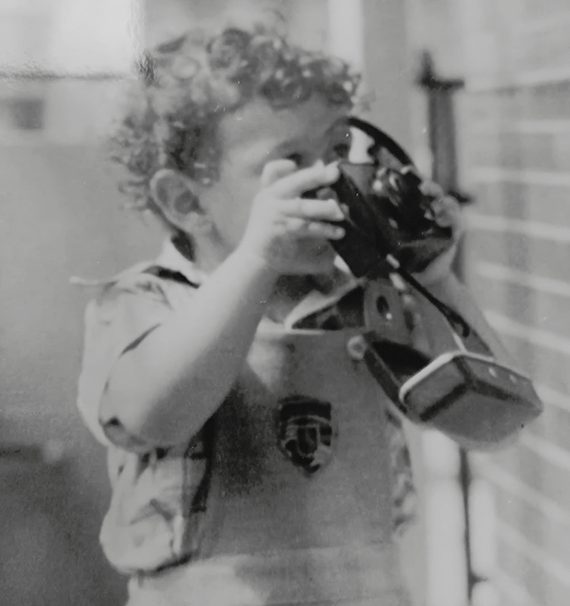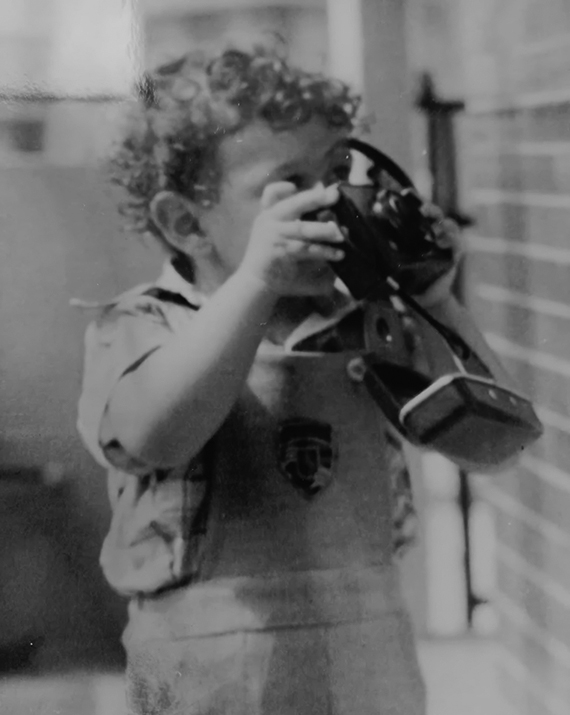Through the lens and beyond
This childhood photo of me with my camera always amuses me, as I still find myself spending a lot of time looking beyond the viewfinder.
A documentary filmmaker approaches the camera differently than a movie director, the same can be said for news videographers, photojournalists, and anyone else who captures real life: we must strive to focus both on the camera and the world outside.
What lies beyond the frame is the essence of reality, while what occurs within the lens is merely a fraction of the whole.
There is no script or storyboard; only your instinct, the courage to take risks, and the willingness to embrace mistakes.

A documentary filmmaker approaches the camera differently than a movie director, the same can be said for news videographers, photojournalists, and anyone else who captures real life: we must strive to focus both on the camera and the world outside.
What lies beyond the frame is the essence of reality, while what occurs within the lens is merely a fraction of the whole.
There is no script or storyboard; only your instinct, the courage to take risks, and the willingness to embrace mistakes.
This childhood photo of me with my camera always amuses me, as I still find myself spending a lot of time looking beyond the viewfinder.

When I was just 14 years old, I began working at a local radio station in my hometown in Italy. It wasn’t a formal job; I would spend a couple of hours each day playing records. The station had two beautiful Lenco turntables—if I remember correctly, they were L75s—with a lever on the left to select 33, 45, or 78 rpm, and a mechanical switch on the right to turn them on and off. This switch was ergonomically designed, allowing me to operate it with just my thumb and forefinger. Being a naturally shy person, I always made sure to cover it with my hand to muffle the mechanical noise, hoping no one would come in and see what I was playing.
There was a radio show where listeners could call in to request a song and dedicate it to someone special —friends, family, and most often, crushes. Occasionally, we would invite the most daring callers to go live on air, giving them a platform to share their stories or choose a song for their loved ones. “Giovanni wants to wish happy birthday to his mom… Cristina would like to thank Francesca for being her best friend… Teresa loves ‘Eternal Flame’ by The Bangles and has a message for Massimo: ‘Do you feel the same?’… Anonymous to Valentina: ‘I like you so much and would love to talk to you, but I don’t have the courage.’”
I wanted to get to know all these people and their voices, to stay connected and find out how their stories unfolded. While I started working at the radio station out of a love for music, I soon realized I had fallen in love with the stories of the people behind that music.

In Italian, the word “obiettivo” carries a double meaning: “lens” and “goal.” This creates a fascinating connection between photography or cinematography and personal aspirations. A lens serves as a technical tool to focus and capture a specific image, allowing us to highlight what’s important and make it visible. A goal reflects what we hope to achieve by concentrating on particular aspects of our aspirations and values. In both photography and life, various contextual elements influence the final outcome: light, framing, and environmental conditions in photography; circumstances, opportunities, and challenges in life. I’ve always found these contextual elements more intriguing than the final result itself.
I’m captivated by the aspects around the edges that lend greater meaning to the center and by what lies behind what everyone can see. I am constantly searching for stories that deserve to be told and finding ways to share them with as many people as possible. I primarily use audiovisual technology—cameras, microphones, computers, etc.—to do this. Most of the time, the end product is a long documentary that can be viewed on TV or in a movie theater. However, I often create shorter videos to engage web audiences. I also enjoy writing for print media and producing content for radio.
While I frequently work on my own projects, I also take on assignments to tell other people’s stories, including those behind a brand. I find brand storytelling particularly fascinating because, while we often see only the visible aspects of a product, we must remember that it is people who create companies, not the other way around.

When I was just 14 years old, I began working at a local radio station in my hometown in Italy. It wasn’t a formal job; I would spend a couple of hours each day playing records. The station had two beautiful Lenco turntables—if I remember correctly, they were L75s—with a lever on the left to select 33, 45, or 78 rpm, and a mechanical switch on the right to turn them on and off. This switch was ergonomically designed, allowing me to operate it with just my thumb and forefinger. Being a naturally shy person, I always made sure to cover it with my hand to muffle the mechanical noise, hoping no one would come in and see what I was playing.
There was a radio show where listeners could call in to request a song and dedicate it to someone special —friends, family, and most often, crushes. Occasionally, we would invite the most daring callers to go live on air, giving them a platform to share their stories or choose a song for their loved ones. “Giovanni wants to wish happy birthday to his mom… Cristina would like to thank Francesca for being her best friend… Teresa loves ‘Eternal Flame’ by The Bangles and has a message for Massimo: ‘Do you feel the same?’… Anonymous to Valentina: ‘I like you so much and would love to talk to you, but I don’t have the courage.’”
I wanted to get to know all these people and their voices, to stay connected and find out how their stories unfolded. While I started working at the radio station out of a love for music, I soon realized I had fallen in love with the stories of the people behind that music.
In Italian, the word “obiettivo” carries a double meaning: “lens” and “goal.” This creates a fascinating connection between photography or cinematography and personal aspirations. A lens serves as a technical tool to focus and capture a specific image, allowing us to highlight what’s important and make it visible. A goal reflects what we hope to achieve by concentrating on particular aspects of our aspirations and values. In both photography and life, various contextual elements influence the final outcome: light, framing, and environmental conditions in photography; circumstances, opportunities, and challenges in life. I’ve always found these contextual elements more intriguing than the final result itself.
I’m captivated by the aspects around the edges that lend greater meaning to the center and by what lies behind what everyone can see. I am constantly searching for stories that deserve to be told and finding ways to share them with as many people as possible. I primarily use audiovisual technology— cameras, microphones, computers, etc.—to do this. Most of the time, the end product is a long documentary that can be viewed on TV or in a movie theater. However, I often create shorter videos to engage web audiences. I also enjoy writing for print media and producing content for radio.
While I frequently work on my own projects, I also take on assignments to tell other people’s stories, including those behind a brand. I find brand storytelling particularly fascinating because, while we often see only the visible aspects of a product, we must remember that it is people who create companies, not the other way around.